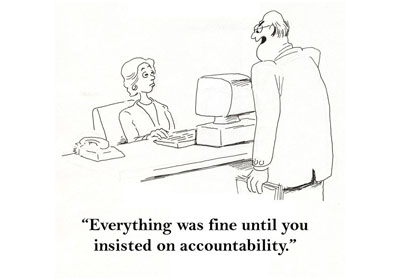Here’s an inspiring post from Neil Crofts on the importance of delivering on our promises:
How many times do organisations make statements, commitments or promises and then fail to deliver?
How many times do we make statements, commitments or promises, on behalf of ourselves or an organisation and then fail to deliver?
For organisations, or even for us as individuals, there may be hundreds of reasons why we fail to deliver and it can often be a bit of a surprise when promises are met.
The first question is who are we making these promises to?
Often with personal challenges like weight loss, diet, exercise etc the promise is mainly to ourselves, but at a personal level we may also make such statements to family and others close to us. For organisations the commitments are to employees, shareholders, customers, regulators and other stakeholders.
The second question is what kind of statement is it really?
Some statements are just information – “the next train will be ten minutes late” (although if it is now 15 minutes late, would be passengers may see that as a broken promise).
Others are promises – “we promise 99% of our trains will not be more than 10 minutes late.”
Some are aspirations – “Our aim is for 99% of trains to be on time.”
It is important that the communication of these statements is not ambiguous, it is very easy to be caught out by an aspiration being taken as a promise. We are all frequently guilty of wording that construes an aspiration as a promise.
Thirdly we need deep self knowledge or organisational awareness to be able to know which aspirations or promises are realistic and which are not.
The reason we fail on our promises and aspiration is a mixture of over ambition, under commitment and very occasionally force majeure.
If organisations are to gain a reputation for reliability, those who might make statements to stakeholders first have to know the organisation well, they also have to be very aware of the kind of statement they are making, they have to be deeply personally committed to making it happen and they have to be willing to configure the organisation around making it happen.
If we take our railway example above, what would it take to deliver on any sort of reliability promise?
- If we didn’t have control of key variables, such as the track, we would need to have highly trusting relationships with those partners to minimise those risks.
- We would need to be confident in the quality of our own equipment, such as computer systems and rolling stock.
- We would need to have good relationships with our own employees and build a real culture of trust and punctuality to be able to rely on them to deliver.
- We would need the commitment to the promise to be deeply shared by all executives and leaders and for them to continually reinforce it.
- We would need to organise things, like rewards, recognition and culture so that meeting the promise matters to all of those with a role in delivering it – emotionally, physically, rationally and spiritually.
- We would need to not have too many such promises so that people could stay focussed.
Do you agree with Neil? Let us know what you think – we’d love to hear from you. At Leaders Lab we believe in working with leaders to help configure their organisations so that they can both deliver on their promises as well as their aspirations.
